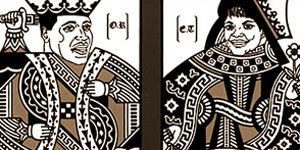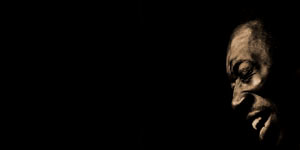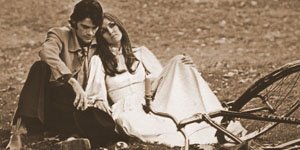Proof of Insanity, Part III
A couple things I’d meant to point out at the beginning of this:
It can be read either as an alternative to Pitchfork’s list or as the Next 200, for those who care about categorizing things with such nicety. (It was also composed before the Pitchfork writers published their alternate choices, some of which coincide with mine, the good-taste bastards.)
If you pay close attention, you may notice a parallel structure between Pitchfork’s list and mine. This is not unintentional.
And of course, comments, contentions, arguments, questions, and so on are welcome. The comment button works on this thing, right?
180. The Beatles “When I’m 64”
(John Lennon/Paul McCartney)
1967
Available on Sgt. Pepper’s Lonely Hearts Club Band
No, I am not shitting you. This is damn near the best thing McCartney ever wrote, and yes, I know that means I’m saying his best work was behind him at age sixteen. Let’s not even get into the typical McCartneyisms: the bouncy melody, the floppy-eared puppy-dog optimism, the steadfast refusal to rawk; instead, let’s note how the wide-eyed protagonist turns out to be vaguely ridiculous, in the classic tradition of English eccentrics: he asks his beloved to fill out a form telling him she loves him. People will often refer to McCartney’s music-hall leanings dismissively, as though entertaining working-class people wasn’t as valid — and, incidentally, more difficult — a goal as riling up horny teenagers.
179. Victor Jara “El Aparecido”
(Victor Jara)
1967
Available on Serie de Oro: Grandes Éxitos*
A musical Ché Guevara, Jara was executed by the Chilean government for his “rise up O working class and throw off the shackles of your capitalist oppressors” songs, speeches, and political stumping. Which would be tragically sad but unimportant to this list if he hadn’t also recorded some great music. Maybe you need to know Spanish for it to really kick you in the gut, but the title means “The Ghost” (literally, “The Apparition”), and the chorus says (loosely), “Run, run, run/Here, there, and farther/Run, run, run/’Cause they’re going to kill you.” The chamber-orchestral backing might be surprising for a folk song, but Latin-American folk music has always had a closer relationship with operatic and European art-music traditions than the gringos have.
*(The 1967 single version is apparently unavailable commercially at the moment; but it’s on the web as a free download. The album version which you can find on CD is from 1970.)
178. Otis Redding & Carla Thomas “Tramp”
(Lowell Fulson/Jimmy McCracklin)
1967
Available on Dreams to Remember: The Otis Redding Anthology
I won’t lay any proto-rap nonsense on you (they’re just talking over a track, folks), but I will note that this sassy lovers’ (or pimp & ho, either way) quarrel type thing has a long history in folk and blues records, notably those of Butterbeans & Susie, a one-time vaudeville act that found success on race records during the Depression. Carla brings the ’tude like Wanda Sykes or somebody, but it’s Otis’s reactions that are priceless, thanks to that sandblaster of a voice, and of course his musical instincts are stop-on-a-dime perfect. You’ll note the use of the opening riff to “(I Know) I’m Losing You” in the post-chorus; the Temptations’ song came first, but this is a better use for it.
177. Pinky Chicks “Yopparatta Omusume”
(Pinky Chicks, presumably)
1968
Available on 60’s Beat Girls: Japanese Pop Cuties in the Swingin’ 60’s
It’s only on import collections from Japan, and I don’t read Japanese, so who knows how this thing came into being. The internet says that “yopparatta” means drunk, and that the song’s about a girl waiting in a bar for her boyfriend and getting progressively hammered. There are sped-up chipmunk voices, apparently to represent the sensory disorientation of drunkenness. There are sounds effects of drinks being poured, and of promiscuous kissing. There’s a groovily-swinging yeh-yeh backing track; the picture of these girls suggests they play their own instruments, but again, who knows? All in all, it has the same exact effect of instinctive aesthetic understanding mixed with total cultural incomprehension as when I try to read manga. It’s awesome.
176. Blue Cheer “Out of Focus”
(Dickie Peterson)
1968
Available on Vincebus Eruptum
“Summertime Blues” was their hit, but it was done better by Eddie Cochran ten years earlier and by the Who two years later (and by Joan Jett fifteen years later, but never mind). This is where what Lenny Kaye called punk rock (and what we generally call garage-rock today) started boiling over into a thick, viscous sound that would be understood as heavy metal when Tommy Iommi shuffled, blinking, into the dim light. They try to bite Hendrix, Entwhistle and Baker, but they don’t have the tools, so they rely on bashing and yelling, like the Stooges but not as intellectual. And you could say that the angsty chorus “won’t somebody tell me what’s wrong/tell me what’s wrong with me” anticipates modern moan-rock like Nickelback, but that would be unkind. What did Blue Cheer ever do to you?
175. Brenda Lee “I’m Sorry”
(Dub Albritton/Ronnie Self)
1960
Available on The Definitive Collection
Those swooping strings, right at the beginning, could cut glass: goodbye, the teenage Brenda Lee who sa-uh-ha-uh-hang “My Boy Elvis,” hello, the teenage Brenda Lee who sets the gold standard for all teen-drama songs in the Sixties; from the Shangri-La’s to Gene Pitney, they all owe her teen-idol-meets-Nashville sound an enormous debt. She sounds like a little girl in all that cavernous orchestration, yet her voice swells to match, and then it flutters like she’s about to break down and cry, but why? She’s sorry (I got that much), but she never says what for; and she sounds way too young to have done anything that bad; ’dja scratch the paint on his jalopy, or what?
174. Allan Sherman “You Went the Wrong Way, Old King Louie”
(John Benson Brooks/Bob Russell/Allan Sherman)
1963
Available on My Son, the Box
A showbiz nebbish in LaLa-Land, Sherman built a following by entertaining well-oiled parties of celebrities and other studio wonks; that’s them laughing between lines. He’s best known for the Dr. Demento staple “Hello Muddah, Hello Fadduh,” but this (from the same album) is his apex, both in terms of sheer funnyness and in terms of the clever lyric, worthy of Ira Gershwin or Lorenz Hart. The song being parodied is the 1948 pop-swing classic “You Came a Long Way from St. Louis,” but you don’t need to know that; just enjoy the thing. Ever since angsty adolescents began to run the pop market in the late 50s, humor in popular music has taken such a nosedive that songs with humorous lyrics are novelties and Weird Al is a giant in the field. Forget the parody business: this could’ve been a classic patter hit in the days of Jerome Kern and P. G. Wodehouse, when songs were songs and didn’t have to be afraid of a little sentimentality or a little laughter, dammit.
173. Mose Allison “Everyody’s Cryin’ Mercy”
(Mose Allison)
1968
Available on I’ve Been Doin’ Some Thinkin’
Huh. I just found out that Bonnie Raitt covered this song. I only know the original; I’ve been an Allison fan ever since I read that Pete Townshend thought his songs were scary. (Probably thought he was black.) But restraint has always been the key to Allison’s appeal; he’s so soft-spoken that you get the impression he’s holding an enormous amount back, and that it could go off like a hydrogen bomb if he cuts loose. Here it does, at least lyrically, as he unloads on hypocrites big and small from within a controlled bebop-blues format that keeps the sensitive material from overheating. And I’ll eat the proverbial hat if this song (and Allison in general) wasn’t an enormous influence on another soft-voiced piano-based cynic/humanist, Randy Newman.
172. Joe Williams “Get Out of My Life Woman”
(Allen Toussaint)
1966
Available on Presenting Joe Williams and the Thad Jones/Mel Lewis Jazz Orchestra
Joe Williams was one of the great jazz vocalists, and in the running for the great male jazz vocalist. He was the voice of the Count Basie band in the 50’s, and when he went solo he tried all sorts of things. One of them was this: a Kansas City take on a stone New Orleans r&b classic. The drumming is Meters funky; the brass rocks like, well, like Basie. The solos are rubbery and sound like they knew what Maceo and the J.B.’s were up to. And Williams himself: man. His achey-hoarse voice stretches and slides like he’s got something to prove when he could be resting on his laurels. If jazz hadn’t been heading for the stars, it could’ve taken a tip from this and remained pop-relevant. This may be the best rendition of a Toussaint song that Toussaint had nothing to do with.
171. B. J. Thomas “Raindrops Keep Falling on My Head”
(Burt Bacharach/Hal David)
1969
Available on the Butch Cassidy & the Sundance Kid soundtrack
Country what? This is Twentieth Century Pop, this is, the opening guitar strum sounding more like a voh-dee-oh-doh ukelele, and the lyrics turning a Cole Porter trick or two. Yes, B. J. Thomas was sold as a hunky country singer, but he could sing anything: check the final “nothin’s worryin’ me” for a bit of baritone melisma. Anyway, children hear this song in their dreams, it’s so perfect and delicate and summertime. Works great in the movie, too, especially if you’ve seen it before and know how it ends. The characteristic Bacharach melancholy sucker-punches you when Newman gets on that bicycle, and — aw, damn, I’m tearing up already.
Next: 170-161. >>

No comments:
Post a Comment